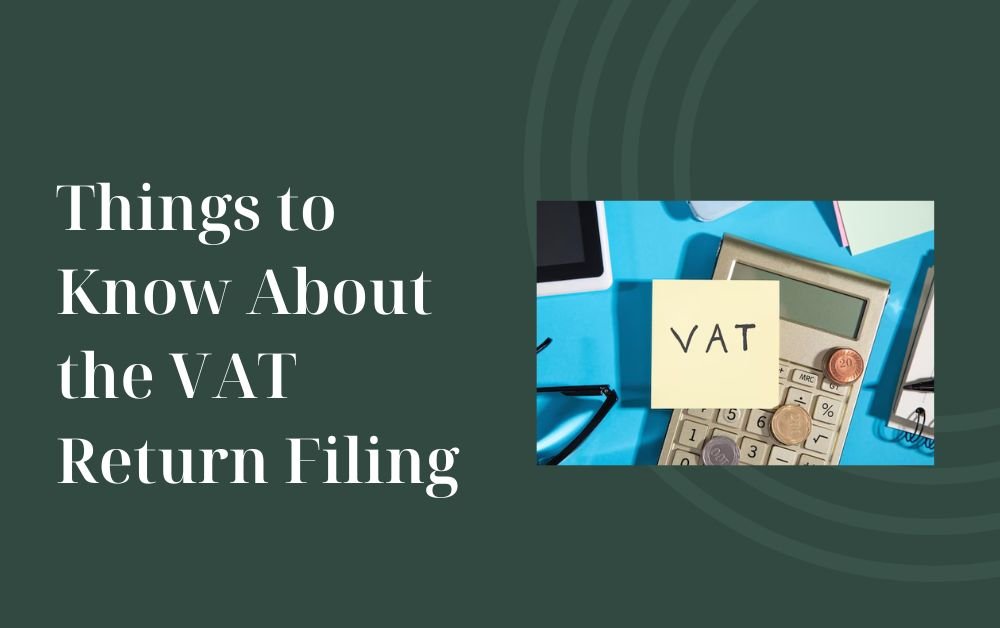Navigating the world of taxes can be complicated, but understanding how to handle VAT (Value Added Tax) return filing is crucial for any business that is subject to VAT.This blog will cover everything you need to know about VAT return filing, making it simple and straightforward to understand.
What is VAT?
Understanding Value Added Tax (VAT)
VAT is a type of tax that is charged on most goods and services that are bought and sold. It is a consumption tax because it’s usually included in the price.. The responsibility for collecting and submitting this tax lies with businesses.
Who Needs to File VAT Returns?
Any business that is registered for VAT and has a VAT number must file VAT returns. This includes businesses of all sizes across various industries.
Note:- For expert guidance and streamlined VAT return filing services in UAE, don’t hesitate—contact our consultants today! Ensure your business complies seamlessly with VAT regulations. Contact us now for a consultation!
The VAT Return Process
How Often to File VAT Returns
The frequency of VAT return filing can vary by country and sometimes by the size of your business. Typically, VAT returns are filed every month or every quarter. It’s important to check the specific requirements in your country to ensure you comply with the local tax laws.
Information Required for Filing VAT Returns
When filing a VAT return, you will need to provide several pieces of information including:
- Total sales and purchases: You need to report the total amount of sales and purchases your business has made during the tax period.
- VAT collected on sales: This is the total amount of VAT you have collected from your customers.
- VAT paid on purchases: This shows how much VAT you have paid on business-related purchases.
- Net VAT: The difference between the VAT collected on sales and the VAT paid on purchases. This is the amount you will either pay to or reclaim from the tax authorities.
Preparing to File VAT Returns
Keeping Accurate Records
To accurately prepare your VAT return, you must keep detailed records of all your business transactions. This includes invoices, receipts, and other relevant financial documents.
Calculating Your VAT
You will need to calculate the amount of VAT you owe or are owed by subtracting the VAT paid on purchases from the VAT collected on sales. This calculation must be accurate to avoid errors in your VAT return that could lead to penalties.
Filing Your VAT Return

How to File a VAT Return
Most countries now require or offer the option to file VAT returns electronically. Electronic filing is not only faster but also reduces the likelihood of errors.
Common Challenges in VAT Return Filing
Dealing with Complex Transactions
Certain transactions can be more complex to handle when it comes to VAT. For example, dealing with exports and imports, or digital services provided across borders can complicate VAT calculations. In such cases, it might be beneficial to consult a tax professional.
Avoiding Penalties
Late filings or inaccuracies in your VAT returns can result in penalties. It’s important to stay organized, keep accurate records, and adhere to all filing deadlines to avoid these penalties. Regularly reviewing your VAT processes and staying updated with any changes in VAT laws are also good practices.
Additional Insights on Seeking Professional Help
Leverage Expert Advice for Complex Transactions
VAT regulations can be intricate, especially when dealing with complex or unusual transactions. These might include international trade, digital services across borders, or dealing with exempt supplies where VAT is not charged at the standard rate. A professional accountant or tax advisor specializes in navigating these complexities. They can offer strategic advice that not only helps in ensuring compliance but also optimizes your tax liability, potentially saving your business significant amounts of money.
Stay Updated with Regulation Changes
Tax laws, especially those pertaining to VAT, are subject to change. Staying updated with these changes can be a daunting task for any business owner. Professional tax advisors keep abreast of all regulatory updates and can inform you of any changes that might affect your business. This is crucial for maintaining compliance and for planning future business strategies that align with new tax laws.
Customized Planning and Reporting
Every business is unique, and a standard approach might not be the most efficient when it comes to VAT compliance. Professional services offer customized planning and reporting to fit your specific business needs. This could involve tailoring your accounting systems to better track and manage VAT transactions or creating customized reports that provide deeper insights into your financial status and tax obligations.
Conclusion
By keeping accurate records, understanding how to calculate your VAT, and knowing the filing process, you can ensure compliance and avoid potential issues with tax authorities. If ever in doubt, don’t hesitate to seek help from a professional accountant or tax advisor who can provide guidance specific to your business needs.
Note:- To read more articles visit on bithobbies.






More Stories
Cargo Corteiz A Cultural in Streetwear
The New Frontier: How ETFs are Revolutionizing Investing in Vietnam
Top 10 Reasons for Professional Accounting